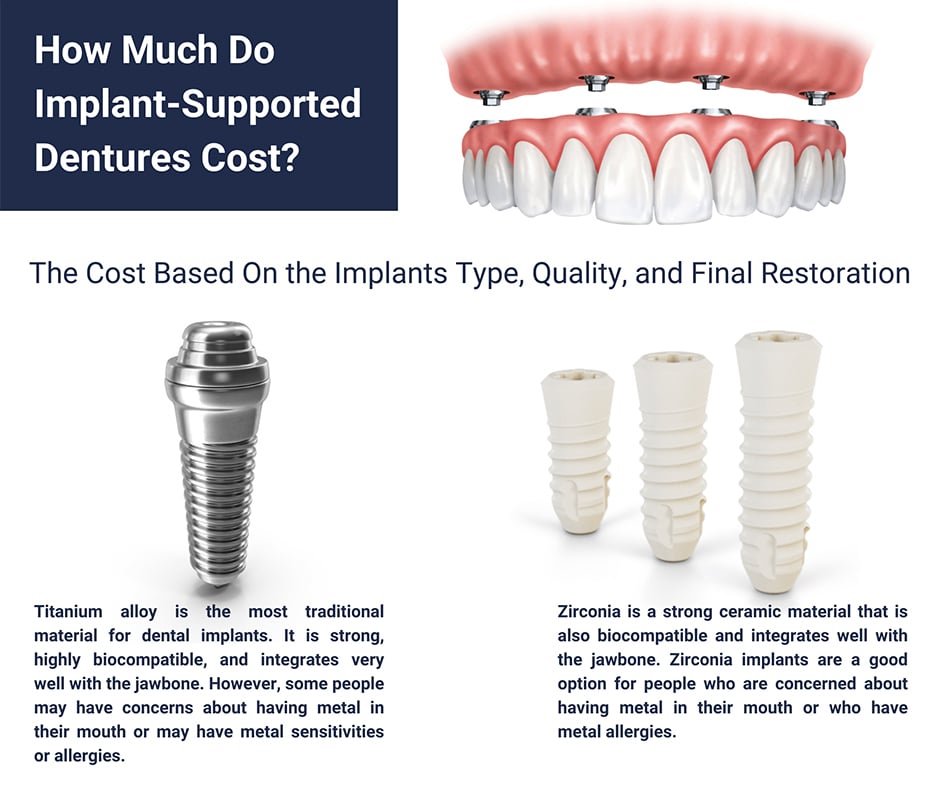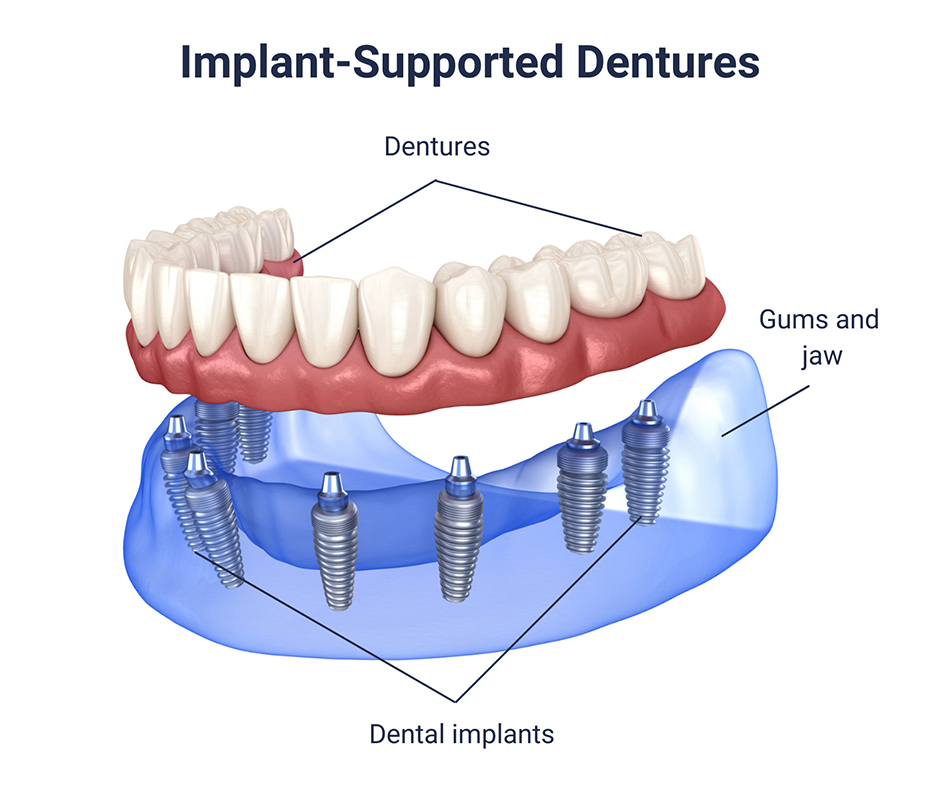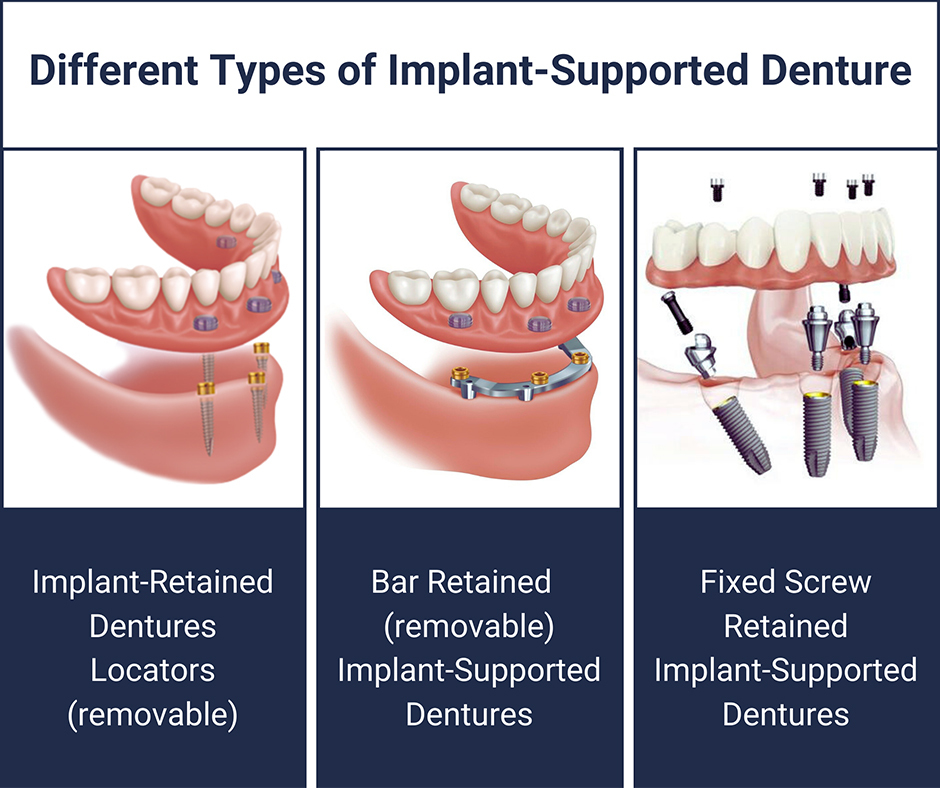Table of contents
Complete tooth loss affecting your upper or lower jaw or both jaws is a common problem; obviously, it is extremely difficult to function without a complete set of teeth. Ordinary dentures remain a popular option but are far from perfect.
An ordinary denture rests directly on the gums, relying on the gums and the underlying jawbone for support and retention. Unfortunately, jawbone resorption soon occurs after tooth loss, resulting in declining support and retention for a denture. This is why dentures that originally fitted quite well and stayed in place nicely soon become loose, uncomfortable, and can rub on the gums. Loose dentures can make it difficult to eat properly, and a wide range of foods may be inedible with dentures. Having a loose denture also affects speech, and it’s hardly surprising that many people find this extremely embarrassing.

Resolving the Problem of Loose Dentures
- Relining dentures. Dentists can reline the fitting surface of ordinary dentures to help them fit more securely, but this does not address the underlying problem of declining retention due to jawbone resorption.
- Denture adhesive. Denture adhesive can be used to help keep dentures in place, but it can be messy and expensive.
Dental implants
People with dentures are increasingly turning to dental implants as a solution to the problem of loose dentures. Instead of a denture rubbing uncomfortably on the gums, it is held firmly in place with dental implants surgically placed in the jawbone, providing a stable foundation and eliminating the need for denture adhesive.
There is a common misconception that implants are very expensive. While this may be true to a degree, plenty of implant treatments are cost-effective, including implant-supported dentures. However, the costs of this treatment can vary depending on several factors, including:
- The type of implant system
- The number of implants required
- The preparation process
- The type and quality of the dental implants and final restoration
If you are considering dental implants, call Dr. Rahmani to discuss if dental implants can be a cost-effective solution to the problem of loose dentures.

-
The Cost Based On Type of Dental Implant System
Numerous dental implant systems are available, and you will need to see an experienced implant dentist to determine which will best suit your needs. Dental implants typically have three components:
- The implant post or screw. The implant screw is inserted into the jawbone, a process requiring a short surgery. Once the implant is safely and securely in the jawbone, it quickly becomes fused in the bone during a process called Osseointegration. New bone cells grow on and around the implant, which is usually specially treated to encourage this process. Once the post is fused in place, an abutment is attached to the implant.
- The implant abutments. Implant abutments can vary tremendously, depending on the type of implant chosen and the final restoration. While single dental implants can support implant crowns, multiple implants can easily support a larger span of teeth, including a full arch of teeth, for example, an implant-supported denture.
- The implant restoration
Many people are concerned when they hear they need oral surgery, but it’s important to understand that the surgical process is completely painless. It’s not unusual to have minimal or no discomfort afterward. Anyone who is particularly anxious can always opt for sedation dentistry.
Read more: How Painful is Dental Implant Surgery?
The cost of dental implants can vary depending on the type of implant system used.
- Traditional dental implants have a wider body and a longer implant post. They are typically more expensive than mini dental implants. Traditional dental implants require an implant dentist to make a small incision in the gum to expose the bone underneath before inserting the implant.
- Mini dental implants are sometimes used to support a denture and are cheaper than traditional dental implants. Mini dental implants can be inserted directly through the gum and into the jaw. This is a less invasive procedure that can be performed with less discomfort to the patient.

-
The Cost Based On The Number of Implants Required
The number of dental implants required to secure a denture can vary from as few as two to 6 dental implants. The fewer implants that are needed, the lower the treatment cost, but you need to be guided by your dental implant dentist. While some implant dentists may offer an implant-supported denture using as few as two dental implants, others take a more cautious approach and will recommend using all on 4 dental implants to provide better long-term results.
For treatment to be successful, dental implants must be inserted into strong, healthy bone, and not everyone has enough bone available. Using more dental implants to secure a denture can improve treatment outcomes.
Also, the cost depends on whether you need the upper or lower teeth replaced. The jawbone in the upper jaw is naturally weaker and thinner than the lower jaw, so you may need more implants to secure an upper implant denture than a lower one.
-
The Preparation Process
Successful dental implant treatment is meticulously planned following a procedure that includes:
- Diagnostic imaging
- Computerized treatment planning
- Computer-guided surgery
When you first see your implant dentist, they will need to assess your dental health and decide if you need additional treatments, which affect the total cost of successful implant-supported permanent dentures. For example, if you have teeth that are failing, these will need to be extracted.
Bone graft. Some people don’t have adequate bone for implant placement and will need bone grafts to build up the bone in areas where it is deficient. The cost of bone grafting can vary tremendously depending on the amount required, the type of bone used, and the position of the bone graft in the mouth.
Gum graft. It’s also important to have healthy gum tissue. Sometimes gum grafting is also needed to ensure adequate support for the implant restoration and optimal aesthetic results, ensuring your new implant denture not only feels good but also looks good.
-
The Cost Based On the Implants Type, Quality, and Final Restoration
The type of material used for the denture base will affect the implant denture’s cost, durability, and aesthetics. Dental implants can be made from various materials, including titanium alloy and zirconia.
Titanium alloy is the most traditional material for dental implants. It is strong, highly biocompatible, and integrates very well with the jawbone. However, some people may have concerns about having metal in their mouth or may have metal sensitivities or allergies.
Zirconia is a strong ceramic material that is also biocompatible and integrates well with the jawbone. Zirconia implants are a good option for people who are concerned about having metal in their mouth or who have metal allergies.
Quality of implant dentures can also vary tremendously. Some materials are longer lasting and mimic the appearance of natural teeth and gum tissue more closely than others. Other ranges are more budget oriented and might not look as good. Options are: Acrylic resin, Metal, Zirconia.
Your implant dentist can discuss the different materials and quality options available to you and help you choose the best looking and the most cost-effective option for your needs.
The Cost and the Experience of the Implant Dentist
Ensuring you choose the right dental implant dentist is critical for the long-term success of treatment, protecting your investment in your oral health. When selecting your dentist, pay attention to their experience and training, and ideally, look for a specialist like a periodontist.
Choosing an implant dentist with advanced training and skills will ensure you get the best treatment for your needs.
It is important to get a consultation and an estimate from multiple implant dentists to choose the dentist best fits your needs.
Why Choose a Specialist Implant Dentist over a General Dentist?
These days many dentists offer dental implants, but some have only trained a short while before they begin planning and placing implants in their practice. A different types of implant dentists are:
- General dentists: General dentists are trained to provide a wide range of dental services, including implant dentistry. However, they may have only trained using one implant system. If you have a simple case, a general dentist may be able to provide you with the care you need.
- Prosthodontists: Prosthodontists are dentists who specialize in the restoration and replacement of teeth. They have extensive training in implant dentistry and can provide a wide range of implant-based treatments. Prosthodontists are a good option for patients with complex implant cases, such as those needing full-mouth implant reconstruction.
- Periodontists: Periodontists are dentists specializing in treating the gums and supporting structures of the teeth. A skilled implant dentist has trained for years and has experience using numerous implant systems. A periodontist can provide bone and gum grafting, is more likely to have all the diagnostic technology under one roof, and is experienced in planning and placing dental implants using computerized technology. Computer-guided implant surgery is a far more accurate technique, especially when placing multiple implants to restore a complete arch of teeth.
- Oral and maxillofacial surgeons: Oral and maxillofacial surgeons are surgeons who specialize in the treatment of the teeth, jaws, and face. They have extensive training in implant placement and are able to perform complex surgical procedures.
Going for the dentist offering the cheapest dental implants may be tempting. However, they may use generic components that aren’t as high quality as those produced by well-known implant systems, and the planning and placement process may not be so thorough.
Although specialist implant dentists like periodontists can command higher prices for their services, it is worth the additional cost, especially as well-planned and placed dental implants can last for years, if not for life. You can be sure they will use high-quality implant components that have been thoroughly researched and tested by companies that are well-known worldwide. Additionally, if you need implant components replaced, it will be far easier to source them, regardless of where you live. In comparison, generic implant components can be far trickier to identify and replace.
It is important to choose an experienced implant dentist who uses high-quality implant components. While the cost of implant dentistry may be higher, the long-term benefits are often worth the investment.
To learn more about the cost of an implant-supported denture or to schedule a consultation with Dr. Rahmani at the NYC Dental Implants Center, please call or visit our office in person in Midtown Manhattan. Dr. Rahmani is well-known in the area and highly regarded by many peers as the provider of the best implants, including implant-retained dentures, to patients in Manhattan and surrounding areas.
NYC Dental Implants Center
121 East 60th St Ste 6C2
New York, New York 10065
(60th St. btw Park Ave / Lex Ave)
☎ 212-256-0000
Consultation
